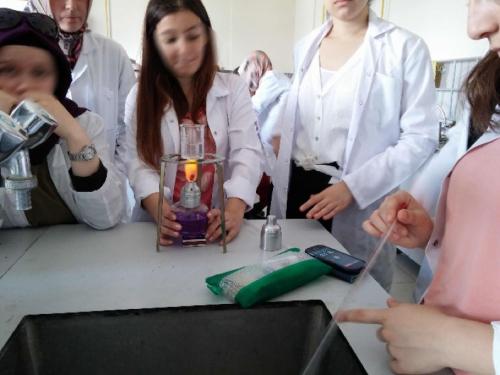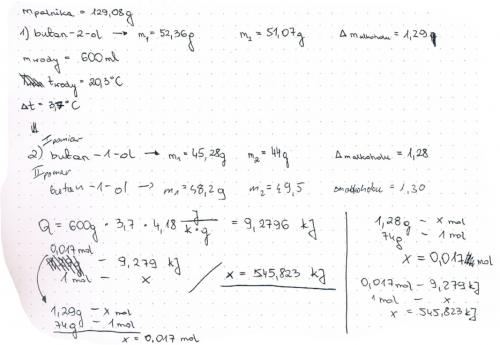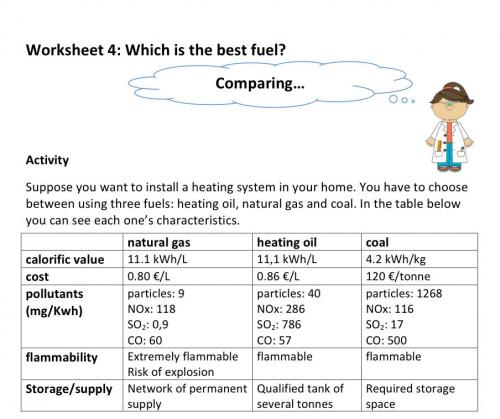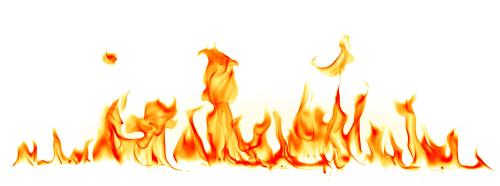The Which is the best fuel? SAILS inquiry and assessment unit aims to encourage students to realise that fuels have different heats of combustion and allow them to realise that the meaning of “best” can change depending on the context. This is achieved by planning and carrying out an experiment to measure heat energy changes and finding enthalpies of combustion experimentally. This activity may be implemented at lower or upper second levels depending on the curriculum’s objectives and full implementation requires four lessons.
Through this unit, students are provided the opportunity to develop a number of inquiry skills such as developing hypotheses, planning investigations (designing and conducting an experiment), and forming coherent arguments (drawing appropriate conclusions using reasoned arguments). In addition they build their scientific reasoning capabilities by collecting meaningful data, and enrich their scientific literacy through analysis of scientific data and presentation of scientific conclusions.
This unit was trialled by teachers in Turkey, Poland, Greece and Denmark, producing case studies of implementation at both lower and upper second level. Students were aged 14-18 years, and of mixed ability and gender. The teaching approach used in all case studies was bounded or guided inquiry, with some open opportunities. All four SAILS inquiry skills were assessed – planning investigations, developing hypotheses, forming coherent arguments and working collaboratively – as well as scientific reasoning capabilities. The assessment methods described include classroom dialogue, teacher observation, group discussion or presentations and evaluation of student artefacts.
- Enthalpy
- Heat energy
- Heat energy changes
- Calorimetry
- Lower
- Upper
- Planning investigations
- Developing hypotheses
- Forming coherent arguments
- Working collaboratively
- Scientific reasoning
- Scientific literacy
- Classroom dialogue
- Teacher observation
- Peer-assessment
- Self-assessment
- Worksheets
- Student devised materials
- Presentations
The activities in the Which is the best fuel? SAILS inquiry and assessment unit were developed as part of the PARSEL project (Popularity and Relevance of Science Education for Scientific Literacy, which was funded by the European Union’s Sixth Framework Programme in 2006). The teaching and learning activities were adapted for the SAILS project by the team at Hacettepe University.
This unit has been designed for use at both lower and upper second level; depending on the teacher’s aims, different aspects can be emphasised. There are four activities outlined in the unit. In Activity A: Introduction, the students are consider the topic of fuels and the research question, “Which is the best fuel?” In the Activity B: Planning an investigation, the students plan how they might investigate the research question, and in Activity C: Carrying out an investigation, they carry out an experiment to investigate the question. These activities can be presented as an open or bounded inquiry, allowing the students an opportunity to design the experiment. In this case, variables to control (such as the amount of water to be used), the apparatus required and the precautions needed, are not mentioned. In an alternative scenario, using a guided inquiry approach, the design can be simplified by giving the actual experimental instructions and allowing the students to carry out the experiment. Time can then be spent discussing the meaning of “best” as a group activity. In the Activity D: Conclusions, the students form conclusions, determine their choice of the “best fuel” and explain their choice.
This unit is particularly suitable for assessing developing hypotheses, planning investigations and scientific reasoning (drawing conclusions; explaining unexpected results; reporting, comparing, and discussing results, and providing suggestions about how to improve investigations). Students are able to work in diverse teams (working collaboratively) and can produce ideas based on views from team members. Students should learn that fuels have different heats of combustion and that the meaning of “best” can change depending on the context. They should be able to plan and carry out an experiment to measure heat energy changes, and determine enthalpies of combustion based on their results. A suggested assessment scale is provided for evaluation of planning investigations and scientific reasoning, which features eight success criteria. A three-point scale is suggested – acceptable/needs improvement/poor – although teachers can modify these to more accurately reflect their expectations in their classrooms.
Below you can find the full inquiry and assessment unit for download, as well as an archive with classroom materials, including student worksheets and assessment tools for teachers to be used during the activities if available.
Unit booklet Classroom materials| Concept focus |
Understanding enthalpy
Fuels – examples and criteria for identifying the “best” fuels
|
| Inquiry skills focus |
Developing hypotheses
Working collaboratively
|
| Scientific reasoning |
Problem-solving
Making comparisons
|
| Assessment methods |
Classroom dialogue
Student devised materials
|
| Concept focus |
Planning an investigation to compare fuels
Heat of combustion, enthalpy
|
| Inquiry skills focus |
Planning investigations
Working collaboratively
|
| Scientific reasoning |
Identification of variables
|
| Assessment methods |
Classroom dialogue
Teacher observation
Student devised materials
|
| Concept focus |
Understanding enthalpy
Identifying the “best” fuels
|
| Inquiry skills focus |
Planning investigations
Working collaboratively
|
| Scientific reasoning |
Collecting scientific data
|
| Scientific literacy |
Making informed choices of fuel for particular functions
|
| Assessment methods |
Classroom dialogue
Teacher observation
Peer-assessment
Worksheets
Student devised materials
|
| Concept focus |
Understanding enthalpy
Making informed choices of fuel for particular functions
|
| Inquiry skills focus |
Forming coherent arguments
|
| Scientific reasoning |
Making comparisons
|
| Scientific literacy |
Analysis and interpretation of scientific data
|
| Assessment methods |
Classroom dialogue
Worksheets
Student devised materials
Presentations
Other assessment items
|
The Which is the best fuel? SAILS inquiry and assessment unit was trialled in four countries, producing four case studies of its implementation – CS1 Turkey, CS2 Poland, CS3 Greece and CS4 Denmark. The unit was implemented at both lower and upper second level. In CS1 Turkey, the unit was carried out with 22 pre-service science teachers in their first year of training (around 17-18 years) and in CS2 Poland the unit was trialled with students aged 17-18 years. In CS3 Greece and CS4 Denmark the unit was implemented with lower second level students, aged 14-16 years. In all cases, the students were of mixed ability and gender.
The teachers in the case studies all had prior experience in teaching though inquiry, but most students had no prior experience with inquiry, except in CS1 Turkey, where students had experience with inquiry from previous laboratory sessions. The unit was implemented in one to three lessons, over a total duration of 90-135 min. Most case studies implemented it in full, although CS2 Poland implemented the introductory activity as a homework task prior to the laboratory session.
The assessment methods used included classroom dialogue in all case studies, but other methods varied depending on implementation. CS2 Poland, CS3 Greece and CS4 Denmark used self-assessment strategies, while CS1 Turkey and CS3 Greece also used peer-assessment. In all case studies, except CS4 Denmark, the teacher evaluated student artefacts as part of the assessment.
The inquiry approach used in all the case studies was that of guided or bounded inquiry, i.e. the initial investigation topic was proposed by the teacher but students had freedom in how they could investigate the topic. In CS1 Turkey and CS3 Greece, teachers used a guided approach, while in CS2 Poland and CS4 Denmark students were given more possibility of freedom in the work and a bounded inquiry approach was used, with minimal guidance by the teacher. The unit was implemented in full in all case studies, although the manner in which it was implemented varied depending on students’ level and local curricula. Implementation of the unit took place over 1-3 lessons (total duration 90-135 minutes). Students worked in mixed ability groups.
Within the four case studies, the inquiry skills of planning investigations and developing hypotheses were assessed, as well as scientific reasoning (collection of scientific data) and scientific literacy (analysis and interpretation of scientific results), as suggested in the original unit. Formative assessment was used, in particular for assessment of developing hypotheses and planning investigations. Assessment methods used include classroom dialogue, evaluation of worksheets or student-devised materials, self-assessment and peer-assessment.
Below you can find the full inquiry and assessment unit for download (excluding the case studies), as well as an archive containing all the case studies.
Unit booklet Case studies| Concept focus |
Heat of combustion of fuels
The meaning of “best” can change depending on context
|
| Activities implemented |
Introduction
Planning an investigation
Carrying out an investigation
Conclusions
|
| Inquiry skills assessed |
Planning investigations
Developing hypotheses
Working collaboratively
|
| Scientific reasoning |
Collection of scientific data
|
| Scientific literacy |
Analysis and interpretation of scientific data
|
| Assessment methods |
Classroom dialogue
Teacher observation
Peer-assessment
Worksheets
|
| Level |
Upper
|
| Age |
17-18
|
| Prior experience with inquiry |
Some experience
|
| Concept focus |
Fuel, heat capacity, enthalpy of combustion
|
| Activities implemented |
Planning an investigation
Carrying out an investigation
Conclusions
|
| Inquiry skills assessed |
Planning investigations
Developing hypotheses
|
| Scientific reasoning |
Defining variables
Collecting scientific data
|
| Assessment methods |
Classroom dialogue
Worksheets
Student devised materials
|
| Level |
Upper
|
| Age |
17-18
|
| Prior experience with inquiry |
No experience
|
| Concept focus |
Fuels – examples and criteria for identifying the “best” fuels
The meaning of “best” can change depending on context
|
| Activities implemented |
Introduction
Planning an investigation
Carrying out an investigation
Conclusions
|
| Inquiry skills assessed |
Planning investigations
Developing hypotheses
Forming coherent arguments
Working collaboratively
|
| Scientific reasoning |
Making comparisons
|
| Scientific literacy |
Understanding that the meaning of “best” can change depending on context
Making informed choices
|
| Assessment methods |
Classroom dialogue
Teacher observation
Peer-assessment
Self-assessment
Worksheets
Presentations
|
| Level |
Lower
|
| Age |
14-15
|
| Prior experience with inquiry |
No experience
|
| Concept focus |
Development of inquiry skills
|
| Activities implemented |
Introduction
Planning an investigation
Carrying out an investigation
Conclusions
|
| Inquiry skills assessed |
Planning investigations
Forming coherent arguments
Working collaboratively
|
| Assessment methods |
Classroom dialogue
Teacher observation
Self-assessment
|
| Level |
Lower
|
| Age |
15-16
|
| Prior experience with inquiry |
No experience
|




